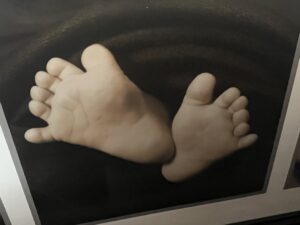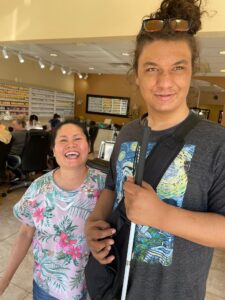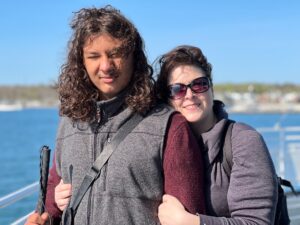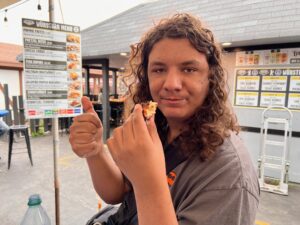Written by Everett Alms
Before I turned 15 years old, my parents had already taken me to see the Grand Canyon, NASA’s Kennedy Space Center, Disney World, Universal Studios, and even Japan. They started planning these trips after I was diagnosed with Bardet-Biedl syndrome (BBS) at five years old. The diagnosis didn’t mean that I wasn’t going to survive childhood, but it did indicate that I would likely experience a number of life-disrupting health complications including an insatiable hunger known as hyperphagia that can lead to severe obesity and losing my vision by the time I was a teenager. The purpose of our trips was to let me literally “see” as much of the world as possible before I couldn’t see anything anymore. I hope that by sharing my story, other families affected by BBS won’t have to experience the frustrations my parents and I have faced.
BBS is a rare genetic disease that can affect a variety of organs and body systems. Those with the condition can experience a wide range of symptoms, but some of the most common include visual impairment caused by retinal abnormalities, polydactyly (extra fingers and toes), kidney malformations,
While I didn’t have a diagnosis of BBS as a baby, the disease began impacting my health before I was even born. When my mom was pregnant with me, specialists told my parents that my kidneys were malformed and that I likely would not survive. When I was born, my kidney function was normal, but I had an extra finger on each hand, an extra toe on each foot, and malformed abnormal bronchi. I also began experiencing seizures when I was 20 months old. My parents noticed that I frequently bumped into things almost as soon as I began walking. They learned years later that I was severely visually impaired and had a lazy eye as well as night blindness. My mom and dad also noticed when I was young that I loved food and could never seem to eat enough, no matter how full my stomach was. I was constantly worried about what my next meal would be.
After years of visiting specialists to undergo countless tests and exams, my mom received a call from my geneticist confirming that I had BBS. Having a name and explanation for my symptoms was a relief at first, but after researching the condition further, my parents were left with new concerns. The diagnosis verified that the passion for food I experienced was actually hyperphagia, which meant a lifelong battle against hunger and obesity. My parents were under the belief that my life would be taken over by concerns about my kidney function, neurological issues, respiratory problems, heart health and vision. Thankfully, our whole family has learned to live to the fullest, despite the challenges that come with a BBS diagnosis.

Even though the BBS-induced extreme hunger that once dictated nearly every moment of my life is now kept at bay, my days are still largely influenced by my condition. After becoming legally blind as a result of BBS by the time I was 12 years old, my parents and I decided that I should transfer schools and enroll at the Wisconsin School for the Blind, where I could continue taking the same classes as my peers while also learning braille and other skills needed to navigate life without my vision. BBS also forces me to constantly be on alert because of the seizures I have as a result of the condition. While I take medication to help prevent them, I have to regularly meet with specialists to monitor my health and work with them to make changes to treatment types and dosages as needed.
My mom has always emphasized the importance of finding the positive aspect of every situation in life, even if it’s difficult. As I have gotten older, I’ve realized that losing my vision as a result of BBS may have shown me a career path. After I finish high school, I would love to continue my education and begin a career as either a braille teacher or as a consultant for Lego—I would love to help their team create kits that are more accessible to people who are visually impaired.
Having BBS has also shown me the importance of using my voice. After receiving my diagnosis, it would have been easy for my parents and I to keep to ourselves and learn how to navigate BBS quietly, but the three of us realize the importance of sharing our experiences so that other families impacted by the disease know that there is hope and that they aren’t alone. I also hope that by sharing my experience, the medical and research communities learn about the impact the disease has on patients and their family members and continue researching improved treatment options for us.
About the Author: Everett Alms lives in Hudson, Wisconsin with his Mom, Dad, and Auntie. The 16-year-old currently attends school at the Wisconsin School for the Blind & Visually Impaired and he is planning to attend Perkins School for the Blind in Watertown, Massachusetts beginning in Fall 2023. He has lived with Bardet-Biedl syndrome, a rare genetic disorder, since birth and was officially diagnosed at age 5. Everett now works with his parents to share his story with the hope of building awareness of the condition and the impact it has on the lives of those affected by it.




